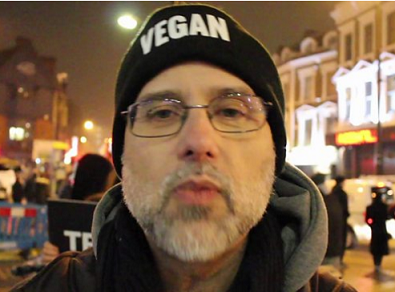
A vegan man is bringing a landmark legal action later, in which a tribunal will decide for the first time whether veganism should be protected in law.
Jordi Casamitjana says he was sacked by the League Against Cruel Sports after disclosing it invested pension funds in firms involved in animal testing.
He claims he was unfairly disciplined and the decision to sack him was because of his veganism.
The League Against Cruel Sports says he was dismissed for gross misconduct.
However, it does not contest that veganism should be protected.
On Thursday, the employment tribunal will consider whether veganism is a “philosophical belief” akin to a religion.
Mr Casamitjana describes himself as an “ethical” vegan and campaigns to get his message to others.
His beliefs affect much of his everyday life. He will, for instance, walk rather than take a bus to avoid accidental crashes with insects or birds
He worked for the animal welfare charity the League Against Cruel Sports, and says that when he drew his bosses’ attention to the pension fund investments, they did nothing so he informed colleagues and was sacked as a result.
Mr Casamitjana claims he was discriminated against on the basis of his ethical veganism belief.
Dietary vegans and ethical vegans both eat a plant-based diet.
However, ethical vegans try to exclude all forms of animal exploitation, for instance avoiding wearing or buying clothing made from wool or leather, or toiletries from companies that carry out animal testing.
They may refer to “companion animals” rather than “pets”, and will avoid zoos or other environments where they consider animals are exploited.
The landmark employment tribunal, in Norwich, will consider whether veganism is a “philosophical or religious belief”.
“Religion or belief” is one of nine “protected characteristics” covered by the Equality Act 2010.
It is unlawful for an employer to discriminate directly, by treating an employee less favourably than others because of their religion or belief.
To qualify as a philosophical belief, veganism must:
- be genuinely held
- be a belief as to a weighty and substantial aspect of human life and behaviour
- attain a certain level of cogency, seriousness, cohesion and importance
- be worthy of respect in a democratic society, not be incompatible with human dignity and not conflict with the fundamental rights of others
- be a belief, not an opinion or viewpoint based on the present state of information available.
If successful, the case could provide vegans with protection against discrimination in employment, education and the provision of goods and services.
Those holding other beliefs could then seek similar legal protection.
Mr Casamitjana’s solicitor Peter Daly, of Slater and Gordon, said: “Ethical veganism is a philosophical belief held by a significant and growing portion of the population in the UK and around the world.
“This case, if successful, will establish that the belief entitles ethical vegans protection from discrimination.
“The case we have prepared sets out how the belief in principle, and how Jordi’s particular interpretations of it, comprehensively meet the required legal test.”
A spokeswoman for the league said: “The League Against Cruel Sports is an inclusive employer, and as this is a hearing to decide whether veganism should be a protected status, something which the league does not contest, it would be inappropriate for us to comment further.”
Source: bbc.co.uk






Be the first to comment